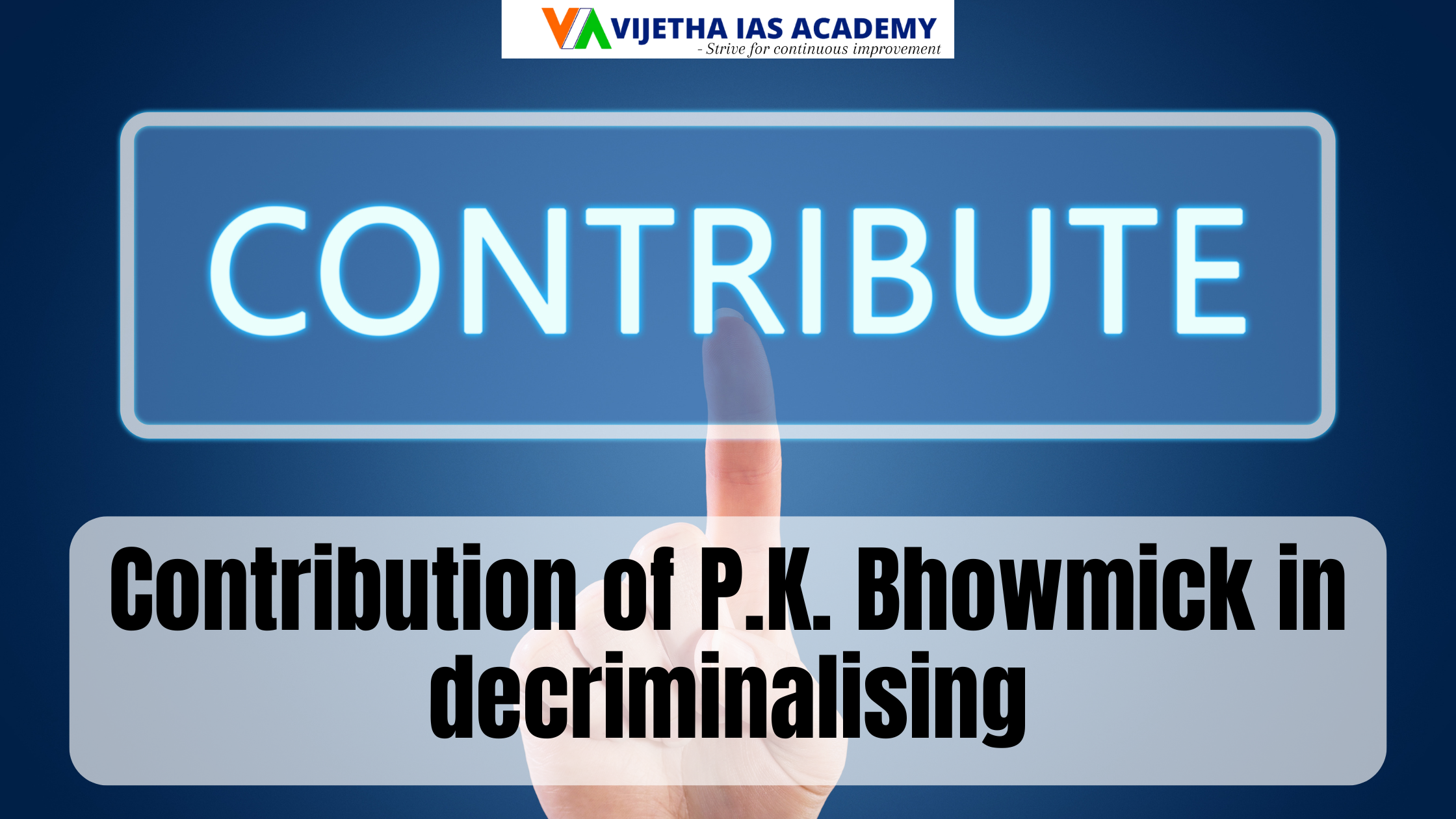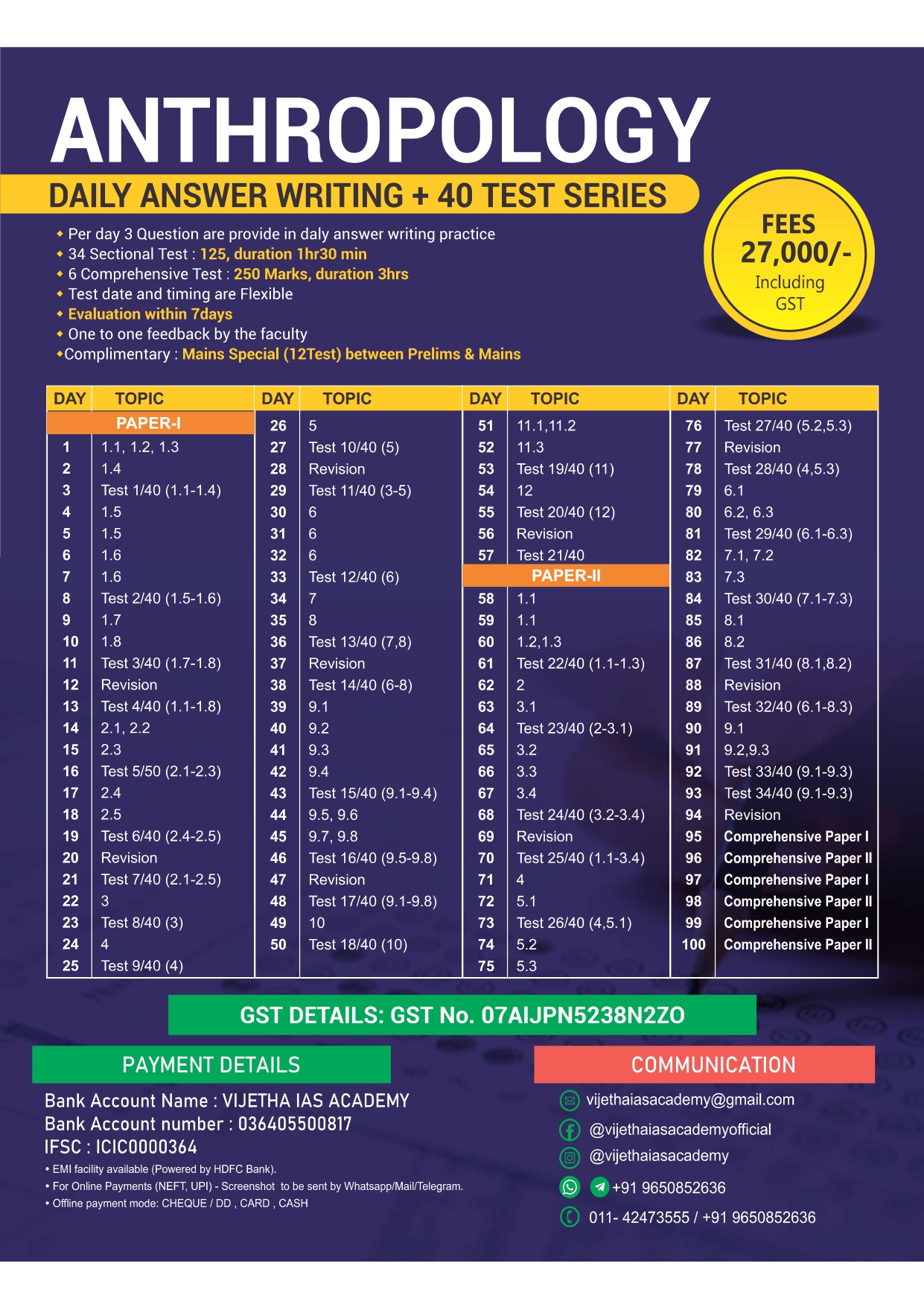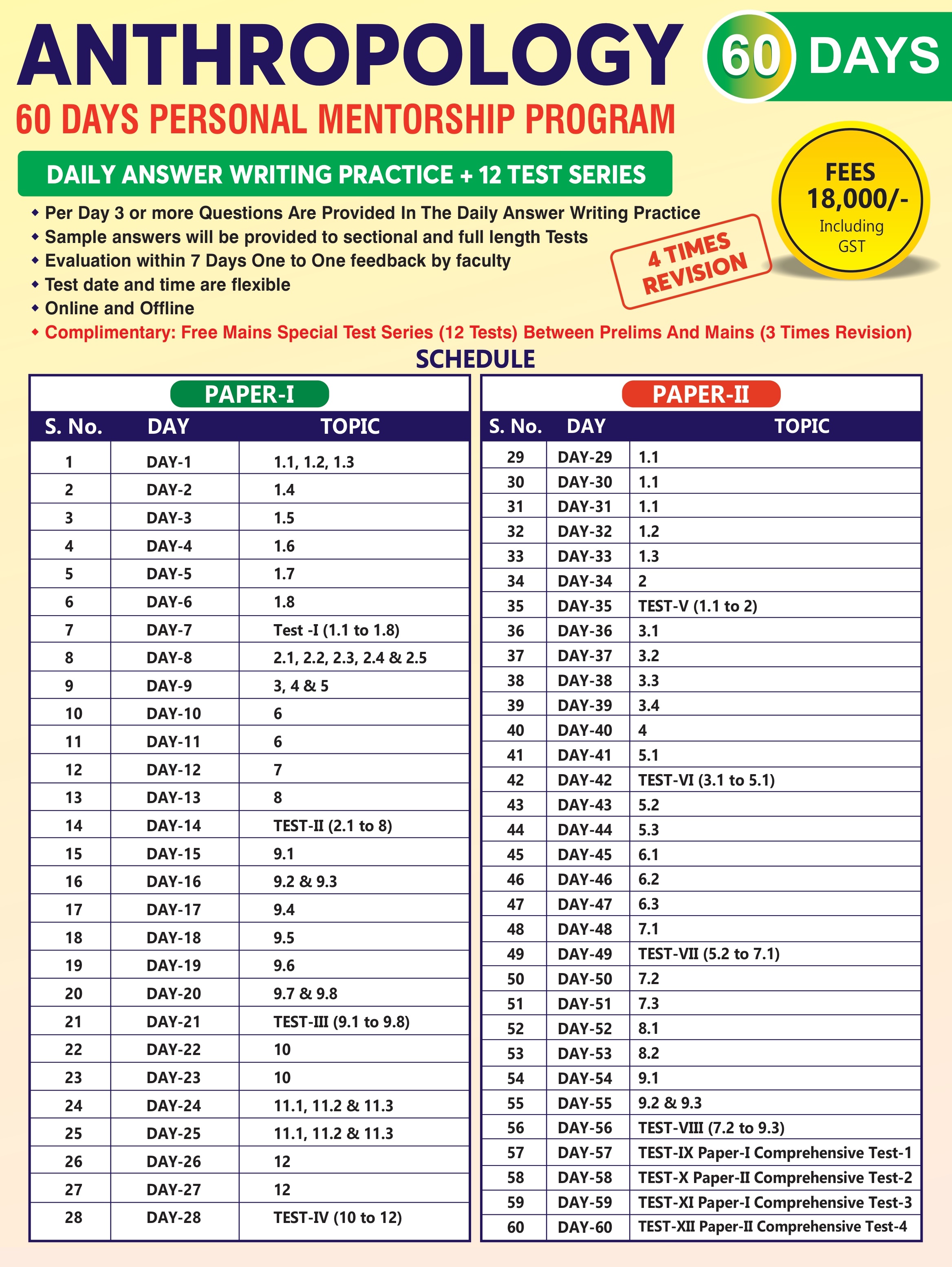
Discuss the contribution of P.K. Bhowmick in decriminalising the status of the Lodha tribe.
(15 Marks) Anthropology Optional Paper CSE 2024
Introduction
P.K. Bhowmick, a renowned Indian anthropologist, made significant contributions to the study of marginalized communities in India, particularly the Lodha tribe of West Bengal. The Lodhas were historically classified as a "criminal tribe" under the Criminal Tribes Act of 1871, a colonial law that stigmatized entire communities as hereditary criminals. This status persisted until the law was repealed in 1952, but the stigma associated with criminal tribes remained. Bhowmick’s research and activism were pivotal in decriminalizing the Lodha tribe and addressing their social and economic marginalization.
Main Body
Background on the Lodha Tribe:
The Lodha tribe is an indigenous community primarily residing in the West Midnapore and Jhargram districts of West Bengal. During British colonial rule, they were labeled a "criminal tribe," which led to systematic oppression, social ostracization, and economic marginalization.
The legacy of the Criminal Tribes Act lingered even after India's independence, with the Lodhas facing discrimination, limited opportunities, and constant surveillance by law enforcement.
P.K. Bhowmick’s Anthropological Work:
P.K. Bhowmick conducted extensive fieldwork among the Lodha tribe, documenting their social structure, cultural practices, and economic challenges. His anthropological studies highlighted the misconceptions and stereotypes associated with the tribe's so-called criminal behavior.
Through his work, Bhowmick demonstrated that the criminal label attached to the Lodhas was not based on their inherent nature but was a product of colonial policies that disrupted their traditional livelihoods and pushed them into economic destitution, sometimes forcing them into petty crimes for survival.
Efforts in Decriminalization:
Bhowmick’s detailed reports and ethnographic studies provided a sociological understanding of the Lodhas’ plight, challenging the notion that they were predisposed to criminal behavior. He argued for their rehabilitation rather than continued stigmatization.
He worked closely with government officials, policymakers, and non-governmental organizations to bring attention to the condition of the Lodhas and advocated for developmental programs that could help uplift the community.
Bhowmick’s advocacy played a role in reforming the approach of law enforcement towards the Lodhas, shifting from punitive measures to social and economic interventions aimed at their integration into mainstream society.
Socio-Economic Rehabilitation:
Bhowmick emphasized the need for vocational training, education, and livelihood opportunities for the Lodha tribe to break the cycle of poverty and marginalization. He advocated for land reforms and employment schemes that could provide the tribe with stable income sources.
His work also highlighted the importance of cultural preservation, ensuring that the tribe's unique cultural identity was respected while addressing their socio-economic challenges.
Long-Term Impact:
While the stigma surrounding the Lodhas has not completely disappeared, P.K. Bhowmick’s contributions have had a lasting impact on the tribe’s decriminalization and gradual rehabilitation. His work brought attention to the structural inequalities faced by the tribe and paved the way for future interventions by the government and civil society.
His studies have also served as a blueprint for understanding and addressing the marginalization of other Denotified Tribes (DNTs) in India, who face similar challenges.
Conclusion
P.K. Bhowmick’s pioneering work in decriminalizing the status of the Lodha tribe stands as a significant contribution to both anthropology and social justice. Through his ethnographic research, advocacy, and collaboration with policymakers, Bhowmick helped shed light on the systemic injustices faced by the Lodhas and worked towards their social and economic rehabilitation. His legacy continues to influence efforts aimed at uplifting marginalized communities and promoting inclusive development in India.
Anthropology Test Series Programme (Online + Offline))
We provide Anthropology Daily Answer Writing a range of programs designed to cater to various stages of UPSC preparation. Whether you're just starting out, have attempted the Mains before, or are getting ready for Mains 2024, we have the right option for you. Allow us to assist you in choosing the course that best fits your needs.
|
Level of Preparation |
Test Series Program |
Test Series Content |
Test Schedule |
|
Self-study of Anthropology Optional |
Anthropology 100 Days Personal Mentorship Program |
Daily answer writing, 34 sectional tests, 6 comprehensive tests, and complementary Mains Special 12 tests (between prelims and mains) |
|
|
Revise whole syllabus through Daily Answer Writing Practice and Tests |
Anthropology DAW Mentorship Program |
Daily Answer Writing Practice and 8 sectional and 4 Full Length tests |
|
|
Revise whole syllabus through Sectional and Full Length Tests |
Anthropology Tier- I T-40 Test Series |
34 Sectionals and 6 Full Length Tests |
|
|
Written Mains earlier and need more practice |
16-Anthropology Tier II Test Series |
10 sectional and 6 Full-Length Tests. |
|
|
Cleared Prelims 2023 and are preparing for Mains 2023 |
Mains Special 12 Tests program |
8 Sectional and 4 Full-Length Tests |
ANTHROPOLOGY MAINS SPECIAL COURSES
Enroll in our Anthropology Mentorship Program today and take the first step towards achieving your UPSC goals!
1) If you are going for Self study of Anthropology Optional and looking for a Comprehensive Program that includes Daily Answer Writing, 34 Sectional tests, 6 Comprehensive tests, and Complementary mains special 12 tests (between prelims and mains), our Anthropology 100 Days Personal Mentorship Program is the perfect choice.
2) If you want to revise Whole Syllabus through Daily Answer Writing Practice and 8 sectional and 4 full length tests, then our Anthropology DAW Mentorship Program is the best fit for you.
3) If you want to revise Whole Syllabus through 34 Sectionals and 6 Full Length Tests then Anthropology Tier- I T-40 Test Series is for you.
4) If you have written Mains earlier and need more practice, then our 16-Anthropology Tier II Test Series is a great option. This test series includes 10 sectional and 6 full-length tests.
5) if you have cleared Prelims 2023 and are preparing for Mains 2023,our Mains Special 12 Tests program is a must-have. This program includes 8 sectional and 4 full-length tests to help you prepare for the big day.
For more information on Vijetha IAS Academy’s Anthropology mentorship programs Deatils : https://vijethaiasacademy.com/anthropology-test-series
Anthropology 100 Days Personal Mentorship Program ( 7 + 3 Times Revision )

Anthropology 60 Days Personal Mentorship Program ( 4 + 3 Times Revision )

For more information: https://vijethaiasacademy.com/anthropology-test-series
Details Of Anthropology Classes Program
Top Anthropology Optional IAS Coaching Center in Delhi Vijetha IAS Academy | Best Anthropology Optional IAS Coaching in Delhi
Fee Structure:
- Tier 1: Rs. 55,150/- (3 Years Validity of Offline/Live Batch)
- Tier 2: Rs. 42,000/-
- Tier 3: Rs. 36,000/-
Batch Size: 50 – 60 Students
UPSC Notes
Anthropology Optional IAS Coaching Notes, IAS Exam Preparation Booklets, IAS optional coaching Notes, UPSC Coaching Notes, Video Lectures, Live Classes with faculty, Chat Facility Available
Teachers Name: N P Kishore Sir
Past Result
- Last Years Result 2023
- 35 Total Selections in CSE 2023
Google Reviews: 4.9 out of 5 stars
Website: Vijetha Anthropology Optional IAS Coaching in Delhi (https://vijethaiasacademy.com)
Faculties of Vijetha IAS Academy
- N P Kishore Sir
Features
- Vijetha IAS Academy offers Online and offline Courses for better preparation of Anthropology Optional Strategy for UPSC in Delhi.
- For better Anthropology optional Exam Preparation, Vijetha IAS Academy Delhi Conducts the Motivational IAS Session.
- Vijetha IAS Academy provides you with the CASE STUDIES on the pattern of the real-time IAS Exam which is helpful for better preparation of the Best Coaching for UPSC Anthropology Optional Optional IAS Examination.
- DAW & WAW – Revision Through Daily & Weekly Answer Writing Practice is offered by Vijetha IAS Academy for better result of the Anthropology Optional IAS examination.
Advantages of joining Vijetha IAS Academy
- Best Faculties for Anthropology Optional IAS Coaching in Delhi
- Best facilities, infrastructure and updated Case Studies Booklets and Notes for better preparation of the Anthropology Optional IAS Examination in Delhi.
- Best result in Past years for Anthropology Optional Strategy for UPSC Examination in Delhi
- Best Rated coaching institute for Anthropology Optional IAS Examination in Delhi.
- Vijetha IAS Academy also provides recorded lectures videos, notes which is very helpful for better preparation of Anthropology Optional IAS Coaching in Delhi
Fees Structure of Vijetha IAS Academy
|
Tier 2 |
Tier 1 |
Tier 3 |
BATCH STARTS FROM |
|
42,000/- |
55,150/- (3 Years Validity Offline/Live Batch) |
36,000/- |
REGISTRATION – START |
Fees Structure of Vijetha IAS Academy
|
Course Name |
Fees Amount |
Course Duration |
|
GS Offline (Pre + Mains+ CSAT) with Essay+Answer Writing |
Rs.99,000 (Including GST) |
400+ Days |
|
GS Online |
Rs.18,999 (Including GST) |
400+ Days |
|
GS Mentorship Programme |
Rs.29,999 (Including GST) |
1 Year |
For more information on our courses, visit our Anthropology Courses page. Explore our Test Series and Online Courses for flexible learning options.
Vijetha IAS Academy
Add. 2nd Floor, 50, Shankar Road, Block 7, Old Rajinder Nagar, Rajinder Nagar, New Delhi, Delhi 110060
MOB. 096508 52636
Open 7 Am : Closes 9 PM
Keywords:
P.K. Bhowmick, Lodha tribe, decriminalisation, anthropology, anthropology 2024 question paper, Anthropology optional subject question paper 2024, Anthropology optional 2024 question paper, Anthropology Optional Coaching UPSC, Vijetha IAS Academy Anthropology, Anthropology crash course UPSC, Anthropology daily answer writing UPSC, Kishore sir Anthropology
